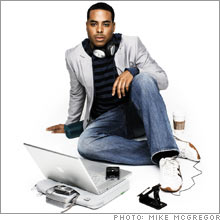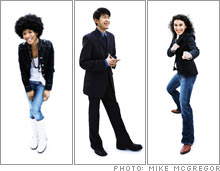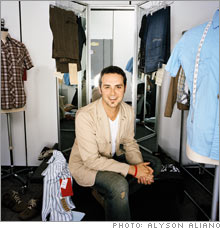Attracting the twentysomething workerThe baby-boomers' kids are marching into the workplace, and look out: This crop of twentysomethings really is different. Fortune's Nadira Hira presents a field guide to Generation Y.(Fortune Magazine) -- Nearly every businessperson over 30 has done it: sat in his office after a staff meeting and - reflecting upon the 25-year-old colleague with two tattoos, a piercing, no watch and a shameless propensity for chatting up the boss - wondered, What is with that guy?! We all know the type: He's a sartorial Ryan Seacrest, a developmental Ferris Bueller, a professional Carlton Banks. (Not up on twentysomethings' media icons? That's the "American Idol" host, the truant Matthew Broderick movie hero, and the overeager Will Smith sidekick in "Fresh Prince of Bel-Air.")
 
At once a hipster and a climber, he is all nonchalance and expectation. He is new, he is annoying, and he and his female counterparts are invading corporate offices across America. Generation Y: Its members are different in many respects, from their upbringing to their politics. But it might be their effect on the workplace that makes them truly noteworthy - more so than other generations of twentysomethings that writers have been collectively profiling since time immemorial. They're ambitious, they're demanding and they question everything, so if there isn't a good reason for that long commute or late night, don't expect them to do it. When it comes to loyalty, the companies they work for are last on their list - behind their families, their friends, their communities, their co-workers and, of course, themselves. But there are a whole lot of them. And as the baby-boomers begin to retire, triggering a ballyhooed worker shortage, businesses are realizing that they may have no choice but to accommodate these curious Gen Y creatures. Especially because if they don't, the creatures will simply go home to their parents, who in all likelihood will welcome them back. Some 64 million skilled workers will be able to retire by the end of this decade, according to the Conference Board, and companies will need to go the extra mile to replace them, even if it means putting up with some outsized expectations. There is a precedent for this: In April 1969, Fortune wrote, "Because the demand for their services so greatly exceeds the supply, young graduates are in a strong position to dictate terms to their prospective employers. Young employees are demanding that they be given productive tasks to do from the first day of work, and that the people they work for notice and react to their performance." Those were the early baby-boomers, and - with their '60s sensibility and navel-gazing - they left their mark on just about every institution they passed through. Now come their children, to confound them. The kids - self-absorbed, gregarious, multitasking, loud, optimistic, pierced - are exactly what the boomers raised them to be, and now they're being themselves all over the business world. It's going to be great. "This is the most high-maintenance workforce in the history of the world," says Bruce Tulgan, the founder of leading generational-research firm RainmakerThinking. "The good news is they're also going to be the most high-performing workforce in the history of the world. They walk in with more information in their heads, more information at their fingertips - and, sure, they have high expectations, but they have the highest expectations first and foremost for themselves." So just who is this fair bird? Plumage The creature in the wild: Joshua Butler, audit associate, KPMG With his broad networker's smile, stiff white collar, and polished onyx cuff links, Joshua Butler has the accouterments of an accountant. Even so, he looks a little out of place in a KPMG conference room. At 22, he's 6-foot-2 and 230 pounds, with a body made for gladiator movies. A native of suburban Washington, D.C., Butler chose accounting after graduating from Howard University because he wanted "transferable skills." At KPMG he's getting them - and more: The firm has let him arrange his schedule to train for a bodybuilding competition, and he's on its tennis team. Even before that, KPMG got his attention when it agreed to move him to New York, his chosen city. "It made me say, 'You know what? This firm has shown a commitment to me. Let me in turn show some commitment to the firm.'" He pauses, a twinkle in his eye. "So this is a merger, if you will - Josh and KPMG." Boomers, know this: You are outnumbered. There are 78.5 million of you, according to Census Bureau figures, and 79.8 million members of Gen Y (for our purposes, those born between 1977 and 1995). And the new generation shares more than just an age bracket. While it may be crass to "define" such a group, any Times Square tourist could probably do so with one finger - pointed at the MTV Networks building. Gen Y sometimes seems to share one overstimulated brain, and it's often tuned to something featuring Lindsay Lohan. Add to that the speed with which Yers can find Lindsay Lohan - day or night, video or audio - in these technology-rich times, and it's suddenly not so strange that Gen Y has developed such a distinct profile. And what a profile it is. As the rest of the nation agonizes over obesity, Gen Yers always seem to be at the gym. More than a third of 18- to 25-year-olds surveyed by the Pew Research Center for the People and the Press have a tattoo, and 30 percent have a piercing somewhere besides their earlobe. But those are considered stylish, not rebellious. And speaking of fashion, this isn't a group you'll catch in flannel. They're all about quiet kitsch - a funky T-shirt under a blazer, artsy jewelry, silly socks - small statements that won't cause trouble. The most important decorations, though, are electronic - iPods, BlackBerrys, laptops - and they're like extra limbs. Nothing is more hilarious than catching a Gen Yer in public without one of those essentials. Let's just say most wouldn't have lasted long on Walden Pond. When it comes to Gen Y's intangible characteristics, the lexicon is less than flattering. Try "needy," "entitled." Despite a consensus that they're not slackers, there is a suspicion that they've avoided that moniker only by creating enough commotion to distract from the fact that they're really not that into "work." Never mind that they often need an entire team - and a couple of cheerleaders - to do anything. For some of them the concept "work ethic" needs rethinking. "I had a conversation with the CFO of a big company in New York," says Tamara Erickson, co-author of the 2006 book "Workforce Crisis," "and he said, 'I can't find anyone to hire who's willing to work 60 hours a week. Can you talk to them?' And I said, 'Why don't I start by talking to you? What they're really telling you is that they're sorry it takes you so long to get your work done.'" That isn't the only rethinking Gen Yers have done. Their widespread consumption of uniform media has had some positive effects. Girls watch sports and play videogames, and no one thinks twice about it. And boys can admit to loving "The Real World" with impunity. Race is even less of an issue for Gen Yers, not just because they're generally accustomed to diversity, but because on any given night they can watch successful mainstream shows featuring everyone from the Oscar-winning rap group Three 6 Mafia to wrestler Hulk Hogan. It all makes for a universe where anything - such as, say, being a bodybuilding accountant - seems possible. Of course, Gen Yers have been told since they were toddlers that they can be anything they can imagine. It's an idea they clung to as they grew up and as their outlook was shaken by the Columbine shootings and 9/11. More than the nuclear threat of their parents' day, those attacks were immediate, potentially personal, and completely unpredictable. And each new clip of Al Gore spreading inconvenient truths or of polar bears drowning from lack of ice told Gen Yers they were not promised a healthy, happy tomorrow. So they're determined to live their best lives now. |
Sponsors
| ||||||||||||||||||||


